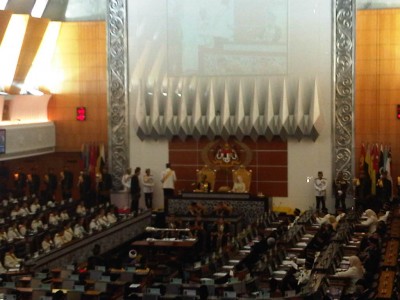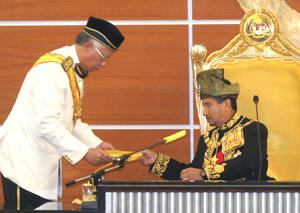This article is neither about Colin Firth nor King George VI. It is about the High King of Malaysia, Tuanku Mizan Zainal Abidin, the speech he made in the opening of the 4th session of the 12th Parliament, and the institutional set-up surrounding it.

This season of Parliament opened in a bang – literally, as the ceremony was accompanied by a 21 guns of salutes when the national anthem was played. It is a convention of the Parliamentary system that the first meeting of Parliament every calendar year will be officiated by the High King a.k.a. Yang Di-Pertuan Agong. The first day was participated by member of both House, that is the Senators from the Senate a.k.a. the Upper House, and the Member of Parliament from the House of Representative a.k.a. the lower house. Together with invited guests (mostly diplomats and top civil servants) they gather in the lower chamber as the King speaks.
The root word for Parliament is Parle, which mean “speak” in French. Parliament is an institution in Parliamentary democracy system that serves as the voice of the people. The Dewan Rakyat (House of Representatives) is made up of members that are popularly voted, The Dewan Negara (Senate) represents the respective states and minorities group, while the YDPA is important as a national symbol, whose royal assent to all bills is necessary for it to become gazette.
A former colony to the Great Britain, the Malaysia governance system is modeled after their Constitutional Monarchy system with adaptations to local scenario. As a matter of historical fact, the House of Commons of United Kingdom was originated in the 13th century to gather the knights and burgesses – representatives of the laypeople, when the monarchy of Britain seek to impose tax from the commoners, and hence the saying, “No taxation without representation”. Parliamentary Democracy is a system where the people manage the country, while the monarchy remains the figurehead.
In the age of democracy, the Kings under the Constitutional Monarchy system serve as a symbol of nation unity. As can be seen in the movie “the King’s speech”, King George VI was to deliver a pertinently uplifting speech (painstakingly, as the movie tells) as the Great Britain declared war with Germany in September 1939. Similarly, Japan emperor’s speech in the light of the recent tsunami was meant to bring comfort to the disaster-struck nation.
Contrary to parliamentary system is the presidential system, where the head of state is the head of government, that is, the president that is voted in by elections such as the United States. The President thus could come from a different party as the majority party in the Congress, unlike in the Parliamentary system, where the prime minister always comes from the same party as the majority party of Parliament. The Prime Minister is a person with majority confidence from the Parliament, who together with his cabinet act as the “steward” of the country for the monarchy.
Whether which is a better system is subject to many debates. The fact remains that under the Constitutional Monarchy system, the monarchy is represented by the government, and thus his speech is to outline the policy of the government and the success of the government. In fact, his speech is known to be written by the government, a practice accepted under the constitutional monarchy system and is symbolized ceremonially with the Prime Minister handing the written speech to him before he start. The King’s speech is not meant to be absolute, but is subject to debate and can be amended with a move of a motion.

Unfortunately in this country, questions regarding the royalty and their role are often a taboo. Any begs to differ are always seen as disloyalty to the monarchy and seditious, and often accused to be a threat to the Malay race, as the monarchy is seen as the protector of the special position of the Bumiputeras. Last year in the debate of royal address, Lim Kit Siang’s proposal to amend to royal address was met with great resistance and disapproval by the BN Backbenchers, calling him a traitor to the royalty.
Thanking who?
In this session of Malaysian Parliament, the King (without stammers) congratulated the government for their successes in the Ninth Malaysian Plan, the stabilizing economy growth, and the achievement of Malaysian football team in Suzuki AFF cup, among others. He also reiterated the government’s plan such as the Economic Transformation Programme, NKRA and NKEA, and not forgetting to warn against racial instigators, questioning of constitutional position of Malay rulers and Islam, and, to everyone’s laughter, the misbehavior of Members of Parliament in the Chamber.
After the King’s speech is a two-week long debate session in the Dewan Rakyat, where the Members of Parliament will debate about the royal speech, which in actual fact is everything under the sun. Ninety Members of Parliament had participated in the debate to thank the Royal Address.
The wide scope allowed in the debate also make the session very prone to abuse. Debate often used as an opportunity to put across certain political point as contrary to policy issue pertaining the people, or to upset the rivals. In fact, the proposer of the motion to thank the royal address (a must under the parliamentary procedure), Member of Parliament for Jasin, Datuk Wira Ahmad bin Haji Hamzah who is a Barisan Nasional backbencher (government MPs who does not hold a ministerial position), opened his speech by congratulating his colleagues for their victories in the recent by elections.
Datuk Wira Ahmad bin Haji Hamzah [Jasin]: … Keputusan tersebut jelas menunjukkan bahawa bermula di Manik Urai, disusuli pula di Bagan Pinang dan juga di Batu Sapi, kini rakyat telah kembali yakin dan memberikan sokongan yang padu kepada kepimpinan kerajaan Barisan Nasional sebagai parti pemerintah.
Sometimes, MPs backed up their speech with twisted facts. Dato Haji Lilah Yasin, the MP for Jempol for example, states that Barisan Nasional had never acted draconically, conveniently ignoring the historical fact of Ops Lalang and records of detention without trial of opposition politicians.
Dato’ Haji Lilah Yasin [Jempol]: Kita dalam Barisan Nasional tidak pernah berlaku zalim terutama sekali kepada pembangkang. Kalau kita berlaku zalim sudah ramai kita penjarakan ini.
On another instance, MP for Kinabatangan, Datuk Bung Mokthar called Tony Pua an agent for Singapore without any basis given. When Tony Pua raised to the point of order to ask him to retract his irresponsible statement, the Speaker ruled that it was not necessary as the latter ‘was only joking’.
Cut the Crap
Having said all that, it does not mean that all that were spoken were craps. A lot of pertinent issues were raised by MPs from both sides. People’s welfare and poverty issues in Sabah and Sarawak were popular topics from both sides of the Chamber, perhaps because of the upcoming state election in Sarawak. Among the opposition MPs, a lot of concerns were raised over the Malaysian government plan to build to nuclear plant, as the nuclear crisis in Japan unfolds. “Interlok”, the controversial case of the fifth former literature syllabus, was put forward a few times especially by the Indian MPs. The detention of Alkitab and the Cabinet’s conditional release was also a cause where many opposition MPs championed, especially those from DAP. Other issues raised include the housing schemes, MRT Project, warships procurement to name a few.
Backbenchers MPs on the other hand often make speeches that express their gratefulness to the government. Even if they are putting forward certain issue, they are less harsh to the government. Their pleas are often constituency-based, especially those who are representing a rural area who will use this opportunity to address the grievance of their constituents or ask for more infrastructural development.
As this is penned, the two weeks of debates by backbenchers and opposition has just finished. After this, the minsters from each ministry will make their speech as a respond to the issue raised by the MPs in the debates. It would be interesting to see how it unfolds as the tug-of-war continues.
In theory, this whole exercise of Royal Address, followed by debates and then reply by ministers is good in a working democracy, however, it depends on the MPs whether they could make good use of the session to discuss matters of public importance and not for their own political benefit.
Ivy Kwek watched both “The King’s Speech” and the speech made by the YDPA and is quite sure that no speech therapists were involved in the latter case. She is sometimes annoyed by the childish behavior of certain MPs but has started to take it as a form of entertainment.

@jentayu
Stupid comments by the government MPs are more pertinent, simply because our legislative nad executive systems mean that they have much, much more power than an opposition MP (who, really, has none at all).
Also, with the flaws of our electoral system (gerrymandering and use of government funds as threats), it is likely that these MPs will remain in power despite their terrible comments.
So it is not too biased at all, to highlight crappy comments from high impact individuals. After all, what are the chances of opposition MPs one day being in power? Very low. As low, perhaps, as me being in power, which is why nobody blogs about stupid things I say.
ivy,
tsk. very bias article. a lot of opposition mp also makes stupid statement. y dont u highlight them too eh?
I think the Malaysian Parliament is a great spectacle to be relished and enjoyed.Most of us really dont follow the proceedings seriously.Its about "actors on a stage, with their exits and entrances".Our MP's get to dress well, travel to KL in style, in their uniforms and jackets and make the necessary claims and receive their allowances in large amounts.
Those furthest from KL will get more than KL or Selangor MP's. Some may stay with their girlfrens, new wives, mistresses or relatives, and still claim for 5-star hotels in KL!! Who is to know!!We have no Ombudsman".
Of course the outstation MP's can claim bigger amounts as compared to others living near KL.Could YB Tony Pua enlighten us or ask pertinent questions as to the quantum of allowances and claims for Parliament sittings of 2010 or others??These then are the real "dollars and sense" of Parliament!!
It IS a monkey parliament. Fight fire with fire right? That's why the Beruks (and Malaysians who are Beruks at heart) have to be sent from Loyarburok to keep challenging things that are not right in the running of this country.
The quality of some of the MP is questionable. They are elected because of their 'local background'. But alas,what can we do other than understand that the local folks in that particular area are a different lot from the more affluent urban inhibitants.
Another thing that I like to comment is the remark by the speaker that certain things said by the MP(in the case of MP for Kinabatangan on YB Tony Pua) is just joking,is shaking off his duty as a Speaker of the Dewan Rakyat. In Parliament proceedings,whatever said are meant to be serious,there is no such thing as joking matters. If not,our Parliament will be seen as none other than a 'Monkey Parliament'.
glad you wrote this piece.